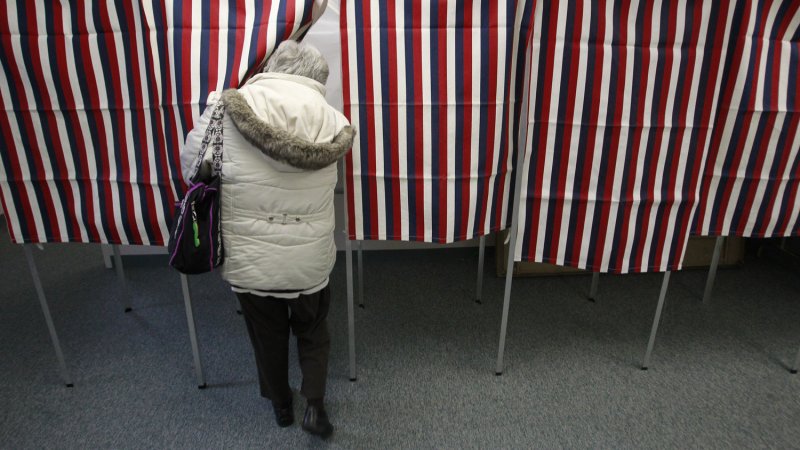1 of 2 | A voter enters the voting booth to fill out her ballot in the first in the nation presidential primary at the Ward 4 polling location at the J.B. Milette Manor in Nashua, New Hampshire on January, 10 2012. UPI/Matthew Healey |
License Photo
The presidential tilt between Democratic nominee President Obama and Republican rival Mitt Romney may head the ballot in November, but further on down voters in more than three dozen states will be asked to approve ballot questions that will, in the end, change how they live.
Massachusetts voters will consider a measure that would allow terminally ill residents die with dignity.
The proposal, modeled after death with dignity laws in other states, would allow licensed doctors prescribe medication to end a terminally ill patient's life at their request.
Voters in Alabama, Arizona, Missouri, Montana and Arizona will be asked to vote on language challenging or opting out of insurance reforms as outlined in the Affordable Care Act, including the individual- or employer-mandated coverage.
Voters in three states -- Massachusetts, Washington and Montana -- will be asked to legalize the use of marijuana for medical purposes.
Ballotpedia.org said its latest Tuesday Count indicated 173 measures will be decided Nov. 6 in 37 states.
Voters in multiple states face lots and lots of yes-or-no questions that seek to revise the state's constitution.
Among the double-digit number of questions on the California ballot are measures that would raise personal income taxes and sales taxes to help cover funding shortfalls for K-12 and community college education. After specific time periods, the increases would expire.
Californians also will decide whether the state's budget cycle should remain annual or shift to a biennial cycle. Nineteen states operate with a biennial budget.
Several states, such as Minnesota, have hot-button issues on the ballot. After a court battle over how the bills are captioned on the ballot, Minnesotans will vote on whether to require a photo identification at the polls and whether to define marriage as being between a man and a woman. The secretary of state unsuccessfully challenged the language passed by the Legislature as too vague.
Voters in Florida better plan on extra time to complete their ballots, which include 11 proposed changes to the state's constitution besides all the national, state and local races, county election officials warn.
"This is the longest ballot I can remember," Pinellas County Supervisor of Elections Deborah Clark told the Tampa Bay Times. "The voter who sees this ballot the first time may need smelling salts."
The Legislature exempted itself from a 75-word maximum requirement, saying it was responding to legal criticism that its amendments were vague and misleading, but now proposals are filled and go one for hundreds of words.
"It's an effort by the Legislature, the body closest to the people, to ensure that voters have the right to vote on these amendments," said Rep. Richard Corcoran, a Republican representing Trinity.
While the lawmaker says voters do their homework before heading to the polls, some election supervisors say they aren't so sure, the Tampa newspaper said.
"To understand these full-text amendments, you almost have to be a Harvard lawyer," said Sharon Harrington, Lee County elections supervisor.
All those extra words may mean a higher rate of "drop-off" as voters overlook state ballot questions altogether, the supervisors say.
"There is such a thing as voter fatigue," Clark said. "You have that with any long ballot."
The Supreme Court in Michigan also got involved in determining the number of questions on that state's ballot, the Detroit Free Press reported.
Michigan voters will be asked to consider five constitutional amendments and whether to retain one state law when they go to the poll. The justices ruled against putting a proposal to authorize eight more Michigan casinos before voters.
In Maryland, public officials are urging voters to bone up on the seven questions that measure nearly 700 words, The Washington Post reported.
Among the amendments are questions asking whether Maryland should legalize gay marriage and give college tuition aid to illegal immigrants.
However, one referendum asking whether a casino should be approved doesn't include the word "casino," the Post reported.
And critics contend that the question on the state's version of the Development, Relief and Education for Alien Minors suggest it would help residents other than undocumented immigrants.
Texans will consider 10 proposed constitutional amendments in November.
A proposal on the Louisiana ballot asks, "Do you support an amendment to the constitution of the State of Louisiana to provide that the right to keep and bear arms is a fundamental right and any restriction of that right requires the highest standard of review by a court?"















